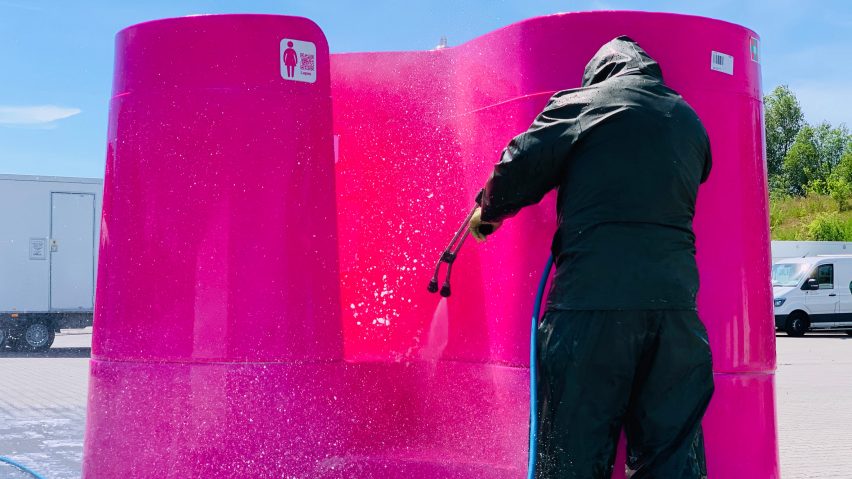Cities in France are installing outdoor urinals as the coronavirus lockdowns causes a lack of public toilet facilities.
The closure of public toilets along with bars, cafes and other venues with facilities means people have nowhere to go to the bathroom when they are out of their homes. In London, there are reports of desperate people using the bushes in parks.
Urinal designers are responding to the problem, and report that cities in France will soon be improving their public facilities.
"From this week you can find Lapee in the streets of Rennes," the designers of the Lapee urinal for women and nonbinary people told Dezeen.
"Lapee fits perfectly with the summer time and Covid-19 hygiene regulations," added French architect and Lapee co-founder Gina Périer. "It can be installed basically everywhere. Lapee is made for every place where there is a need for safe and hygienic solutions for womxn to pee."
French design studio Faltazi, who caused a scandal when their Uritrottoirs were installed on the streets of Paris in 2018, told Dezeen they are installing the composting urinal units in Chambéry this month.
"Our outdoor urinals respond perfectly to this problem of distancing," Faltazi co-founder Laurent Lebot told Dezeen.
The Uritrottoir is an environmentally-friendly outdoor urinal featuring a bright red box with a trough that funnels urine into a box of sawdust inside its metal body.
Faltazi also makes an easy-to-assemble urinal for outdoor events such as festivals. The Uritonnoir is made by strapping funnels to straw bales, which can be composted afterwards.
"The Uritonnoirs, our country version of the Uritrottoir can, of course, be installed in parks," said Lebot. "You just have to get straw bales from farmers."
Using a Uritrottoir or Uritonnoir doesn't require touching the unit and they're used in the open air, where the level of ventilation means transmission of coronavirus is reduced.
Lapee is also touchfree, allowing the user to step up between the sheltering sides and squat to urinate. "Of course if you need some support you can always hold from its walls or support yourself with your elbows," said Périer.
"It's also a win-win situation because you can work out while you pee," she added. "But it's up to you – we see it as a completely touch-free solution. And if you end up touching surfaces, it is totally okay since we provide hand sanitiser to clean your hands."
In response to the pandemic, Lapee's designers have added a metal holster for hand sanitiser that attaches to the middle of the structuree. As a piece of industrial design, the hardwearing plastic frame was already made to withstand regular hosing down.
"You can easily spray [Lapee] with vinegar or other disinfectants. It functions as one monolith so the whole cleaning process doesn't take more than a couple of minutes," said Périer. "The material that Lapee is made from is very durable, it can last for many many years even if it's being sanitised every day."
Lapee was designed to help ease the queues at music festivals, where people who need to squat to pee have to wait longer.
Women and people who need to squat to pee are particularly vulnerable when public toilet facilities are reduced, such as during this pandemic. There are fewer places they can use safely and higher risks of health issues such as urinary tract infections (UTIs) if they cannot go regularly. Human urine is also very bad for plants and can pollute rivers.
As a Danish company, Lapee is also in talks with Copenhagen's city government to get the urinals installed in time for the summer.
"Things are going really well for Denmark in terms of Covid-19 and summer is just around the corner. We believe people are going to be more and more outside enjoying the nice weather – of course with regulations – but still gathering in parks, hanging out by the water and visiting outdoor markets," said Périer.
"As it is a new concept it always takes a bit more time to get things done – especially through governmental procedures. But more cities will have it in the near future and we are really happy about it."
Coronavirus has lead to increased demand for touchless toilets and other bathroom equipment. "It is entirely feasible to create an environment which eliminates the need to touch surfaces," chief design officer of LIXIL told Dezeen.
Images courtesy of Lapee and Faltazi.

